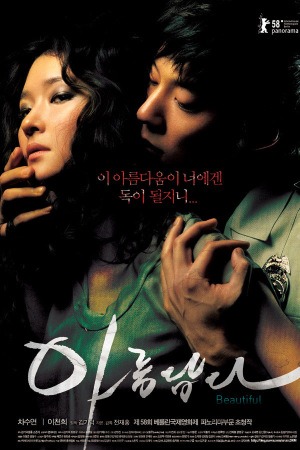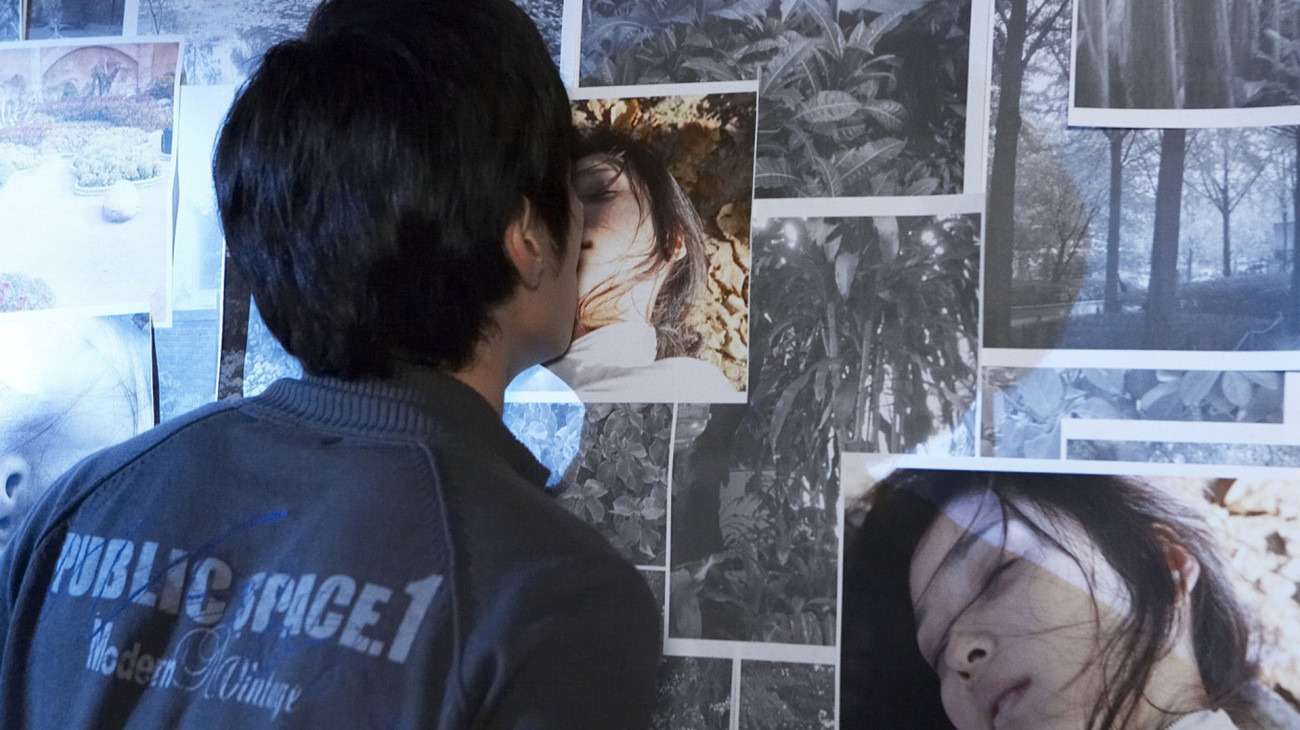
The 44th Chicago International Film Festival
First, the disclaimer.
Part of going to a film festival is recognising that sometimes things get messed up: prints don't show, screening times are pushed at the last minute, et cetera. Thus it happens that there was something wrong with the projection when I saw Juhn Jaihong's Beautiful. First, there was a stretch of about two minutes at the start where the film was framed incorrectly; the projectionist matted the image incorrectly so that the top of the film frame was open - meaning that there were boom mics and lights visible in nearly every shot - and far too much of the bottom was covered - meaning that the subtitles couldn't be seen. After a tiny bit of this, the projectionist flipped from using a standard lens to an anamorphic lens, revealing the entire film frame, but stretching it out wide, so that all the characters were short and fat (among other problems), and because the whole frame was being projected, we could still see boom mics and lights.
The result was far from satisfying, but festivals are as they will be. The problem is that I essentially haven't seen Beautiful in anything like an appropriate manner, and even if I hadn't been so distracted by the warped images for the whole running time, it would still hold true that I couldn't possibly judge the film's imagery in any sort of accurate way - and film being a primarily visual medium, that's quite a big setback. I seriously thought about skipping this review altogether, but I can at least discuss the plot and to a certain extent, the acting, so instead I'm just going to put out this heavily qualified pseudo-review.
Beautiful follows Kim Eun-Yeong (Cha Su-Yeon), a woman of unsurpassed physical beauty. Her daily life is a frustrating, non-stop parade of men following her in the street and sending her flowers, of children begging for her autograph even though she's not famous, and of women treating her with scorn. As the film begins, Eun-Yeong has largely resigned herself to this fate (there's little if any suggestion that she's a closet narcissist who enjoys the attention), but events quickly start up that force her out of her complacency: one of her many secret admirers, Eun-Cheul (Lee Cheon-Hee) forces his way into her apartment and rapes her; as he leaves, he mentions that he's planning on turning himself into the police. And he eventually does just that, although when Eun-Yeong arrives at the station to identify him, the scuzzy detective on duty makes it very clear that any woman that beautiful can't blame men for losing control around her.
At that moment, Eun-Yeong hits upon a solution to her problem: she must make herself ugly. First, this means marathon over-eating, but after a trip to the hospital reveals that plan to be a bit harder and more dangerous than she'd expected, she turns to anorexia (although what we see onscreen is actually bulimia). Meanwhile, she is silently followed by Detective Kim (Choi Myeong-Su), who keeps saving her from herself, as his concern for her well-being ultimately turns into a frightening obsession. This being an Asian film, everything ends in blood.
The story was written by Kim Ki-Duk, one of the biggest names in contemporary Korean cinema, and his influence is strongly felt in the finished project; however there's a certain lack of subtlety in writer-director Juhn's screenplay that reminds us at every turn that he's never made a feature before (he graduated to this job from being Kim's assistant director). Despite her central role, this isn't a film "about" Eun-Yeong (who is a tremendously underdeveloped character, with no apparent inner life whatsoever), it's about the men who use her and judge her - a satire of misogyny and a beauty-obsessed society, essentially. Except that all of the men are so slimy, except for Detective Kim (and only initially, even in his case), and they go to such efforts to prove it, that the film quickly devolves into basically just a series of vignettes: here's a guy, he behaves terribly, Eun-Yeong vomits. Though I don't believe for a second that the film is itself misogynistic (we'd have to not hate at least one of the men for that to be the case), its parade of misogyny inside of it becomes tiring after a while, and then numbing. And "numbing" isn't a good thing for a satire to be. There is at any rate a strong sense that the film believes itself smarter than it comes across.
It's hard for me to say if Juhn is a better director than writer, although I have the sense that he is; the blocking appears to exploit the Z-axis in some interesting ways that add (literal) depth to the image, and the film's editing and pacing (just about the only technical aspect that I can rightly judge) is prone to slightly shorter takes than e.g. Kim's films tend to showcase, which helps to keep the action moving along faster and support our sense that this is all moving to something bad. Still, I can't say that I do or don't recommend the film - though I don't recommend the screenplay - and in good faith I shouldn't even give it a numerical score. But here, with grave misgivings, it is:
5/10, could go up as far as 7/10 or down as low as 4/10
Part of going to a film festival is recognising that sometimes things get messed up: prints don't show, screening times are pushed at the last minute, et cetera. Thus it happens that there was something wrong with the projection when I saw Juhn Jaihong's Beautiful. First, there was a stretch of about two minutes at the start where the film was framed incorrectly; the projectionist matted the image incorrectly so that the top of the film frame was open - meaning that there were boom mics and lights visible in nearly every shot - and far too much of the bottom was covered - meaning that the subtitles couldn't be seen. After a tiny bit of this, the projectionist flipped from using a standard lens to an anamorphic lens, revealing the entire film frame, but stretching it out wide, so that all the characters were short and fat (among other problems), and because the whole frame was being projected, we could still see boom mics and lights.
The result was far from satisfying, but festivals are as they will be. The problem is that I essentially haven't seen Beautiful in anything like an appropriate manner, and even if I hadn't been so distracted by the warped images for the whole running time, it would still hold true that I couldn't possibly judge the film's imagery in any sort of accurate way - and film being a primarily visual medium, that's quite a big setback. I seriously thought about skipping this review altogether, but I can at least discuss the plot and to a certain extent, the acting, so instead I'm just going to put out this heavily qualified pseudo-review.
Beautiful follows Kim Eun-Yeong (Cha Su-Yeon), a woman of unsurpassed physical beauty. Her daily life is a frustrating, non-stop parade of men following her in the street and sending her flowers, of children begging for her autograph even though she's not famous, and of women treating her with scorn. As the film begins, Eun-Yeong has largely resigned herself to this fate (there's little if any suggestion that she's a closet narcissist who enjoys the attention), but events quickly start up that force her out of her complacency: one of her many secret admirers, Eun-Cheul (Lee Cheon-Hee) forces his way into her apartment and rapes her; as he leaves, he mentions that he's planning on turning himself into the police. And he eventually does just that, although when Eun-Yeong arrives at the station to identify him, the scuzzy detective on duty makes it very clear that any woman that beautiful can't blame men for losing control around her.
At that moment, Eun-Yeong hits upon a solution to her problem: she must make herself ugly. First, this means marathon over-eating, but after a trip to the hospital reveals that plan to be a bit harder and more dangerous than she'd expected, she turns to anorexia (although what we see onscreen is actually bulimia). Meanwhile, she is silently followed by Detective Kim (Choi Myeong-Su), who keeps saving her from herself, as his concern for her well-being ultimately turns into a frightening obsession. This being an Asian film, everything ends in blood.
The story was written by Kim Ki-Duk, one of the biggest names in contemporary Korean cinema, and his influence is strongly felt in the finished project; however there's a certain lack of subtlety in writer-director Juhn's screenplay that reminds us at every turn that he's never made a feature before (he graduated to this job from being Kim's assistant director). Despite her central role, this isn't a film "about" Eun-Yeong (who is a tremendously underdeveloped character, with no apparent inner life whatsoever), it's about the men who use her and judge her - a satire of misogyny and a beauty-obsessed society, essentially. Except that all of the men are so slimy, except for Detective Kim (and only initially, even in his case), and they go to such efforts to prove it, that the film quickly devolves into basically just a series of vignettes: here's a guy, he behaves terribly, Eun-Yeong vomits. Though I don't believe for a second that the film is itself misogynistic (we'd have to not hate at least one of the men for that to be the case), its parade of misogyny inside of it becomes tiring after a while, and then numbing. And "numbing" isn't a good thing for a satire to be. There is at any rate a strong sense that the film believes itself smarter than it comes across.
It's hard for me to say if Juhn is a better director than writer, although I have the sense that he is; the blocking appears to exploit the Z-axis in some interesting ways that add (literal) depth to the image, and the film's editing and pacing (just about the only technical aspect that I can rightly judge) is prone to slightly shorter takes than e.g. Kim's films tend to showcase, which helps to keep the action moving along faster and support our sense that this is all moving to something bad. Still, I can't say that I do or don't recommend the film - though I don't recommend the screenplay - and in good faith I shouldn't even give it a numerical score. But here, with grave misgivings, it is:
5/10, could go up as far as 7/10 or down as low as 4/10
Categories: ciff, korean cinema, misogyny






